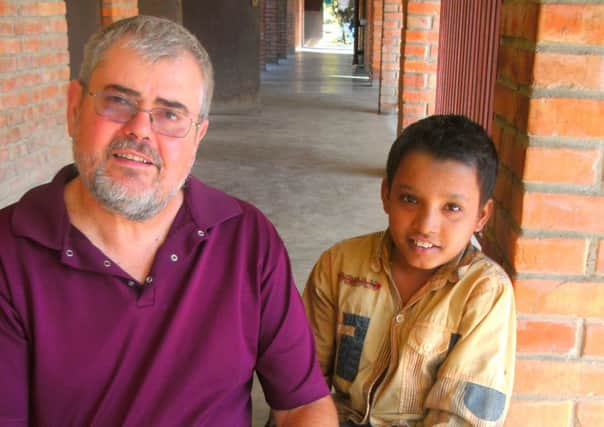Retired surgeon plans return to Nepal to help at leprosy hospital


Richard Waller, 62, first visited the Lalgadh Leprosy Hospital, in Nepal, seven years ago and was shocked by the extremely basic tools which doctors there had access to.
He is due to return to the hospital in February to assist with a research project into specialist footwear for leprosy patients and hopes to take some money with him to hand over to staff.
Advertisement
Hide AdAdvertisement
Hide AdRichard, who lives in Tallington, spent most of his career as a podiatric surgeon working at a clinic in Boston.


Since retiring two years ago he has been doing some medico-legal work and is looking forward to returning to Nepal next year.
Richard said: “Lalgadh Leprosy Hospital is one of the busiest of its kind in the world – and treats thousands of people every year.
“The local surgeons do a fantastic job – assisted by volunteer doctors from all over the world who regularly fly out there – but the equipment in the hospital is extremely dated. Some of the tools wouldn’t look out of place in an English hospital in the 1930s.
Advertisement
Hide AdAdvertisement
Hide Ad“I have some surgical tools which I no longer need and I decided I will donate them when I return to Nepal next year.”


Leprosy is a mildly-infectious disease which damages nerves on the surface of the skin – leading to a loss of sensation.
Because sufferers don’t experience pain, unnoticed injuries such as cuts, burns and broken bones can become infected and lead to serious tissue infections and bone damage.
Many who live with leprosy consequently have deformities on their hands and feet. Blindness is also common because those with leprosy cannot detect grit in the eye.
Advertisement
Hide AdAdvertisement
Hide AdRichard’s interest in the hospital, where services are provided for free, was instigated by an article he read about another British medic who had been volunteering there and doing podiatry and ulcer care.


Realising he had skills and knowledge which may be of use, he decided to pay a visit.
Richard added: “Nepal is an extremely poor country and lepers are at the bottom of the social pile.
“Nobody will employ them and people shun them in the street. There is no NHS. A lot of them have badly deformed feet. Surgery can help with this – as can orthopaedic shoes, but many choose not to wear them because it singles them out as somebody who suffers from leprosy.
Advertisement
Hide AdAdvertisement
Hide Ad“During my next visit, I will be working on a project to design shoes which look ordinary, but which offer additional support where required.”


To help raise some money for the hospital, Richard is planning a talk about leprosy this month at Thurlby Methodist Church, in High Street, Thurlby.
He will also give a practical demonstration – using a surgical power tool and plastic ‘bones’ – of the sort of surgery which can benefit leprosy patients. There will also be an opportunity for those in attendance to have a go.
Richard said: “When I retired I considered selling my power unit – which has various attachments including a reciprocating saw, a universal driver for putting in screws and wires, and a drill.
Advertisement
Hide AdAdvertisement
Hide Ad“But I thought it would be a better idea to take it out to Nepal where it would be a huge improvement over the very basic manual tools they currently use on a daily basis.
“During my talk I will show how the tool works, and there will be a chance for those present to have a go using plastic bones which surgeons train with.”
The power tool is perfect for surgery on small bones such as those found in the hands and feet.
Richard added: “Because leprosy sufferers lose sensation in their hands and feet – it is very common for injuries to go unnoticed and to then cause serious problems.
Advertisement
Hide AdAdvertisement
Hide Ad“Broken bones often reset themselves in strange positions. Protusions can cause sores and sometimes surgery is needed to put that right.”
Richard’s talk will take place on January 14, between 6.30pm and 7.30pm.
Tea, coffee and cake will be served afterwards. Admission is free, but it is hoped people will be generous with donations.